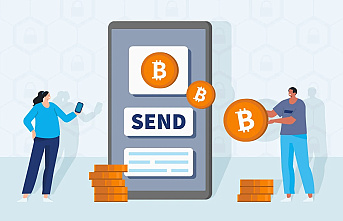Do you think that cryptocurrency is a toy for experimenters and adventurers? Then what does it prevent from becoming an integral part of our life? There is a war of the world government with blockchain as a technology. Two opposing clans, each them is eager to capture the global financial market. And none of them wants to give up their positions using all available means to achieve their goal. We know how it ends...
Why People Still Distrust Cryptocurrencies? Exploring the Skepticism Factors
Investing in cryptocurrencies is not easy but it is the very factor that attracts. As Frank Abagnall, a famous scammer and an author of Catch Me If You Can, said, "If something seems too good to be true, then probably it is so."
A crypt is something alien, incomprehensible like the devil knows what. Because of this, it still remains the lot of marginals and geeks. However, it continues to gain popularity among the public despite the complexities and uncertainties associated with its use. According to the latest survey conducted by NBC, 21% of US adults have already traded or used cryptocurrencies. This suggests that the blockchain is becoming more and more in demand as a means by which the crypt will circulate.
If we put aside prejudice and think about the fact that cryptocurrency is a new form of money then it becomes clear that it will bring a lot of benefits. Crypto allows you to make fast and secure money transfers that do not depend on geographical boundaries. In addition, it can become a hedge against inflation and other economic problems. And this is not to mention the fact that you can protect your assets forever by simply transferring them to a “cold” wallet. Thus, no one from the outside world will be able to influence your state.

Bitcoin has overtaken Western Union and it is worth a lot.
The daily volume of transactions in bitcoins has reached amazing heights surpassing even the volumes of the global payment network Western Union. This proves that bitcoin continues to grow and develop becoming an increasingly popular means of payment. After all, if bitcoins can process more transactions than a large international company like Western Union then this is strong evidence that the future of digital currency can be very promising.
What Prevents Technology from Entering the Daily Life of Americans?
According to recent studies, only 12% of those surveyed admitted that they had invested in cryptocurrency. What are the others waiting for? Or maybe they are not interested in earning for the future; they prefer to live "here and now." And only 2% decided to use digital assets to pay for goods or transfer money to relatives.
When it comes to international transfers, only 1% of respondents felt that cryptocurrency is a convenient tool. Apparently it is easier for the rest to entrust their money to banks with their cosmic commissions for transfers. But as they say: "The old order changes only when the new one is already on its heels." And the cryptocurrency is already knocking on the door of the old banking system.
But the main reason why the crypt cannot overcome the psychological barrier, most likely, lies in human laziness and unwillingness to change the usual way of life. Many people prefer to stay in their comfort zone and use their usual payment methods instead of learning new technology and saving money. In addition, there is some fear of cryptocurrencies associated with anonymity and the possibility of being used for illegal purposes.
Some may be skeptical towards cryptocurrencies due to the decentralized nature of the technology. Most believe that the lack of any control over the blockchain makes life less secure from possible fraudulent activities. In addition to it, mistrust is caused by a lack of understanding of the technology underlying cryptocurrencies which makes its functioning mysterious and incomprehensible.
Cryptocurrency vs. Fiat Money: Why Most People Stick to Traditional Payment Methods?
Having studied the report of JP Morgan Chase & Co. about e-commerce trends you can see several factors that lead to low trust in cryptocurrencies.
One of the main reasons according to the report is the volatility of cryptocurrency prices which is caused by various factors including political and economic changes. This leads to uncertainty and unpredictability about future value forcing investors to stay aside.
The report also notes the lack of regulation at cryptocurrency markets which creates additional risks for large players, the so-called "market makers" who are primarily interested in the crypt flow. It is them who set the trends followed by the "hamsters" trying to jump into the leaving car.
The presence of cybercriminals who use cryptocurrencies for illegal transactions also contributes to low trust.
In addition, the crypto has not yet received wide support and recognition in society and this is a big obstacle to its future development. Some experts believe that it is necessary to improve the infrastructure and regulation first in order to increase the trust in the blockchain as a whole.
Cryptocurrency and the IMF: The War for Financial Freedom
There are two completely different financial systems in the world: a fundamental one based on fiat currencies and a new one based on cryptocurrencies. However, not everyone is happy with this innovation. The International Monetary Fund is especially unhappy.
According to the IMF cryptocurrencies pose a threat to the stability of the global financial system. Cryptocurrency is not controlled by central banks and therefore a priori cannot be used to control the economy. In addition, cryptocurrency transactions can be initiated by illegal immigrants whose activities are often accompanied by money laundering or, which is worse, by terrorist financing.
However, many people including private investors do not agree with this opinion.
“It’s money 2.0, a huge, huge, huge deal.” — Chamath Palihapitiya, venture capitalist
Chamath Palihapitiya was an early employee at Facebook before moving on and setting up his own investment fund.
By 2015, his fund had over $1.1 billion in assets, and he also became a minority shareholder of the Golden State Warriors NBA team. Despite stating he is a disciple of Warren Buffett, they do disagree on the notion of Bitcoin. Palihapitiya is a strong believer in the cryptocurrency. He believes that within the next 20 years, Bitcoin will rise to $1 million.
“I do think Bitcoin is the first [encrypted money] that has the potential to do something like change the world.” – Peter Thiel, co-founder of PayPal.
Peter Thiel and his team had a similar idea to Bitcoin when in the process of creating PayPal. However, at the time, they were unable to get their idea off the ground. Peter Thiel is now one of the largest venture capitalists in Silicon Valley and a staunch Randian. These two factors should show why he has an interest in Bitcoin.
Cryptocurrency is a new form of financial freedom that allows people to control their finances without the intervention of governments and banks. In addition, it can be used to transfer money between countries without having to pay unreasonably high commission fees.
On the one hand, the world government is a powerful organization with colossal resources and the ability to control the world economy. However, their attempts to destroy the cryptocurrency are misguided and directed against the inevitability of progress. Times are changing, technology is evolving and cryptocurrency is a prime example that the new forms of economic relations cannot be stopped.

A visual diagram of bitcoin transfer from the sender to the recipient.
One will ask what’s the interest? As you can see the transaction does not need "pads" in the form of a central bank or other intermediary counterparty. Can you imagine what the consequences could be if the crypt nevertheless establishes a new world order for the money flow?
On the other hand, cryptocurrency is a new form that brings new opportunities to the economy. In turn, the world government is using old methods, intimidation and fake news to compromise and undermine public confidence in cryptocurrencies. However, as the saying goes: "Truth always wins over lies." Good ideas cannot be suppressed by the effort of an outsider who cannot offer an alternative.
In my opinion in the near future we will see the creation of such an alternative to cryptocurrency. It will be a very complex process and it will require a global effort to make the new system widespread and demanded.
And in the meantime, as we see, the blockchain does not receive enough attention and recognition but I am sure that this is only a matter of time. All achievements in this area are mainly due to the efforts of enthusiasts. It seems to me that there is still potential for the development of new technologies in this area and I have no doubt that after a while we will see even more interesting and innovative developments related to the decentralized system.
Conclusion
History knows many examples when new technologies were feared and innovators were met with resistance from conservative forces. However, it was these technologies that ultimately became the engine of progress. Cryptocurrency is no exception. The world cannot stop there and new ideas and technologies will continue to emerge.
Expert Opinions

Lado Okhotnikov, CEO of Meta-force.space, former CEO of Forsage.io
Blockchain is about the present time and not about the future. With its help, instant transactions are already being made without unnecessary waiting, chargebacks and account freezing. Moreover, the blockchain does not charge a commission for an international bank transfer and you can make transactions at any time regardless of whether it is a day off or a weekday. No minimum or maximum account balances, no restrictions for the poor or the rich − blockchain is available to everyone and everywhere!
In addition, the blockchain allows you to create accounts in a few seconds and use them as easily as email. No identity proof and no red tape are needed.
"As a DeFi specialist, I am confident that the future for fintech is here. Blockchain not only ensures the security and reliability of transactions but also increases the efficiency of transfers. In addition, this technology makes it possible to create decentralized financial applications and systems which open up new opportunities for investment and financial development", personally concluded Lado Okhotnikov.
Source - Lado Okhotnikov's LinkedIn page: https://www.linkedin.com/pulse/blockchain-fetish-real-thing-life-lado-okhotnikov

Julian Assange, founder of Wikileaks
Bitcoin's rise can be attributed to its balanced incentives, as stated by its creator. This decentralized cryptocurrency played a crucial role in sustaining Wikileaks when major credit card companies attempted to block its donations. By accepting Bitcoin, Wikileaks circumvented these restrictions and continued its operations. While Bitcoin's creator, Nakamoto, was cautious about supporting Wikileaks to avoid straining the young network, it is not unexpected considering Julian Assange's involvement with the early cypherpunk community. The Cypherpunk mailing list, where ideas like Bitcoin were commonly discussed, provided a fertile ground for the eventual adoption of Bitcoin by Wikileaks.
Hal Finney had long been known in cypherpunk circles

Hal Finney, a key member of PGP Corporation and the Cypherpunk community, envisioned Bitcoin as a future reserve currency for banks, akin to gold in early banking days. His understanding of Bitcoin's potential was shaped by active participation in the Cypherpunk mailing list, where discussions on digital currencies and privacy matters were prevalent during the 1990s.











